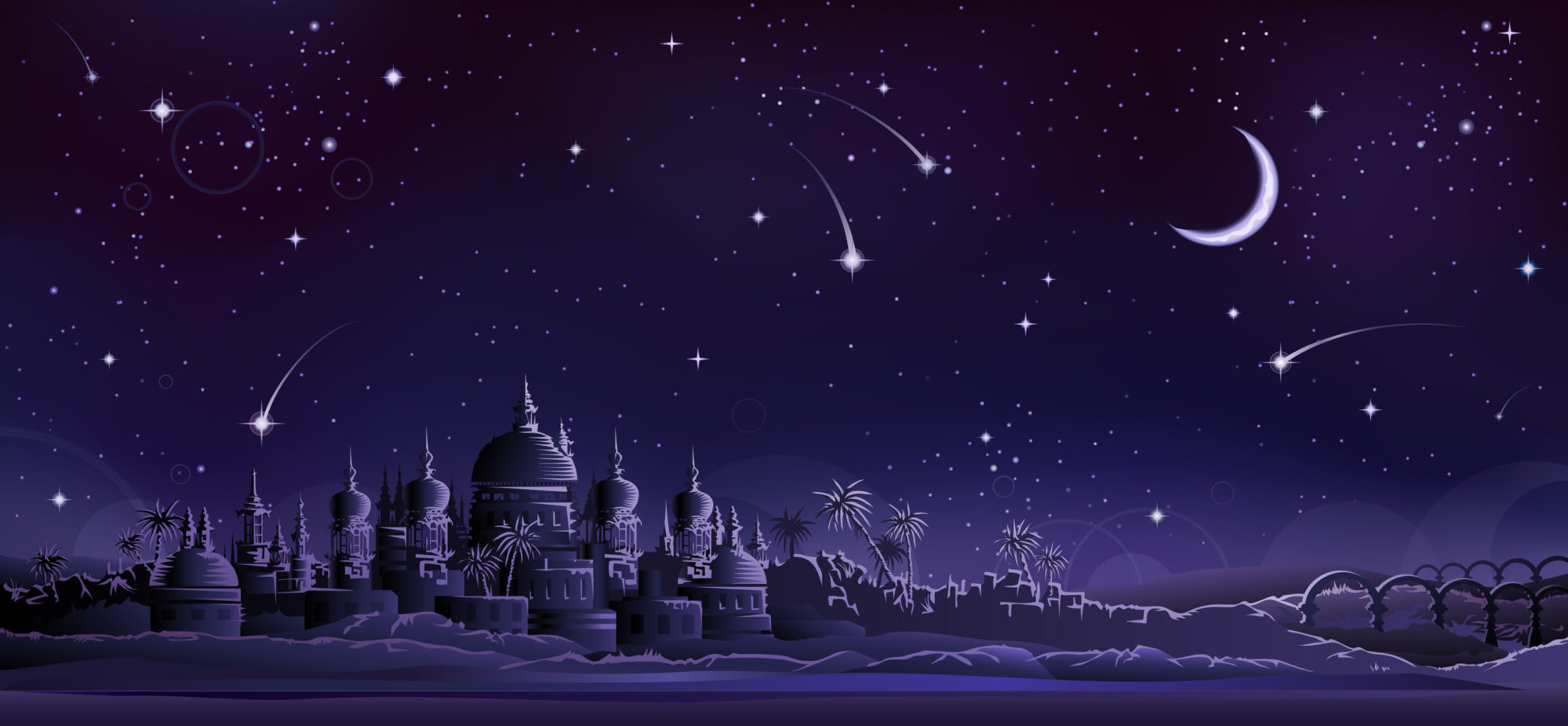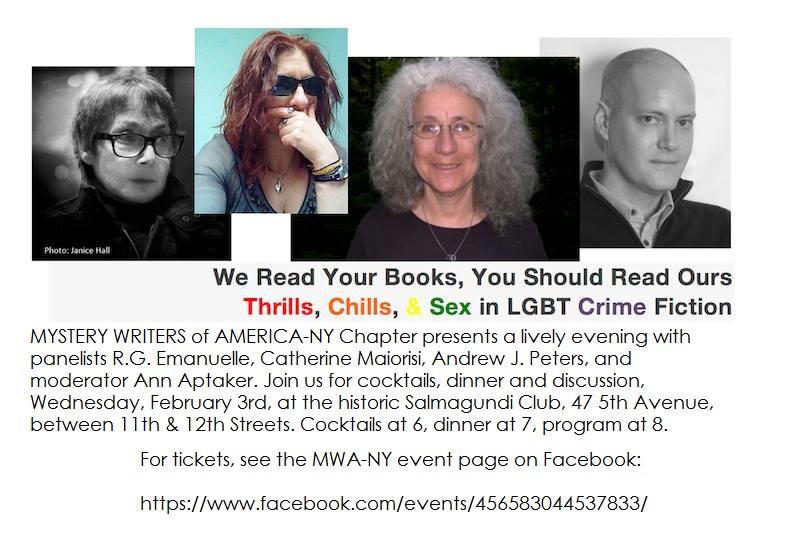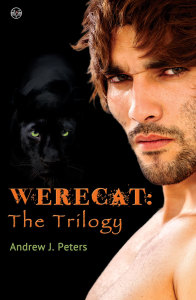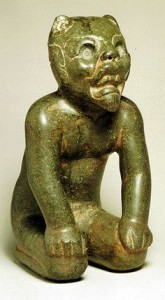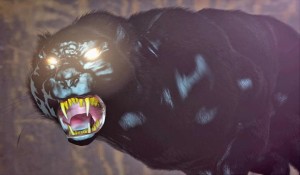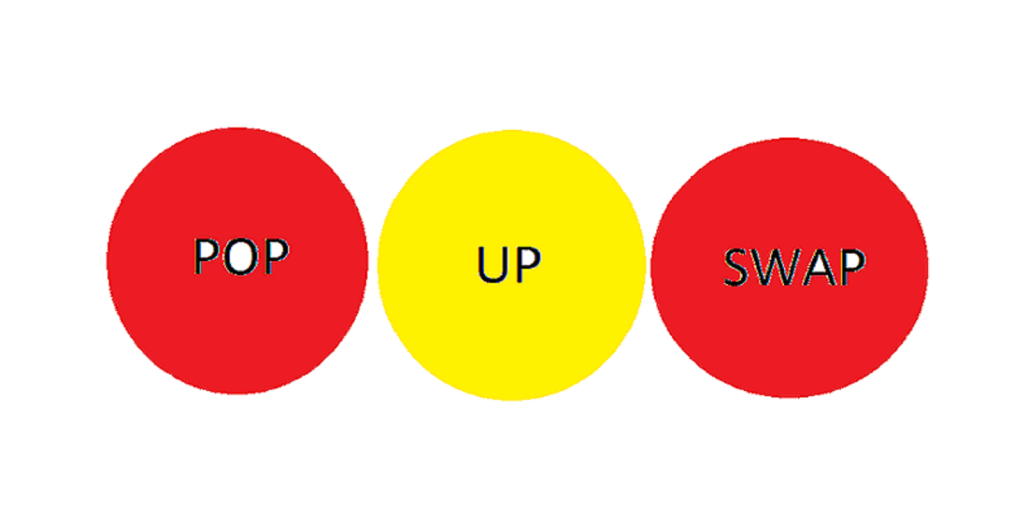
I’m quite excited to introduce a new feature to my blog. It’s called the Pop Up Swap. Basically, it’s an opportunity to get to know some of my favorite authors better by exchanging our books and having a virtual dialogue about them at our respective blogs.
I’m calling it a pop-up because I am offering no guarantees on when or how often I’ll be doing these swaps. They could pop up at any time and disappear faster than a New York City landlord can raise the rent and send starving artists out on the street.
For my inaugural swap, I’m thrilled to have strong-armed, or rather politely convinced the delightfully talented and all-around delightful Elin Gregory to participate!!

Elin is a tad camera shy, but this is her favorite avatar
Elin Gregory is a British author from South Wales who writes historical fiction primarily in an M/M romance vein. She has a really interesting bio.
Elin Gregory lives in South Wales and works in a museum in a castle built on the edge of a Roman fort! She reckons that’s a pretty cool job. It certainly provides more than enough inspiration for her writing.
Although Elin usually writes on historical subjects, she has also written contemporary and historical paranormals, science fiction, crime and a Western, none of which have, as yet, been published. She likes her heroes hard as nails but capable of tenderness when circumstances allow.
Elin’s first published stories appeared in the British Flash and Tea and Crumpet anthologies produced by the UK Meet team. Her historical novella, Alike As Two Bees, and her first novel, On A Lee Shore, were published in 2012. Elin still can’t quite believe it. However, there are always new works on the go and she is currently editing a novel about the British Secret Service between the two World Wars, finishing one set in 6th century AD England and contemplating one set during the Second World War. For more about Elin, visit her blog.

Hereford, South Wales, where Elin calls home
I’m a bit abashed to say I don’t recall precisely how Elin and I met. It was somewhere in the ether of the Internet, whether the blogosphere or the Twitterverse or the Triberr kingdom. I think our correspondence grew out of participating in the Hop Against Homophobia and Transphobia.
In any case, across an oceanic divide, we struck up an online friendship. A shared love for ancient world stories helped with that. I won Elin’s Alike as Two Bees in a contest, and I instantly became a fan. I persuaded her to swap our recent releases and have a conversation about them.
This is my interview with Elin after I read A Taste of Copper, which came out from Love Lane Books in 2014. Here’s the book’s back cover blurb:
 Olivier the squire worships the Black Knight and takes a fierce joy in his prowess as he defends a bridge against all comers. Olivier only wishes that his master loved him as much in return instead of treating him as a servant and occasional plaything.
Olivier the squire worships the Black Knight and takes a fierce joy in his prowess as he defends a bridge against all comers. Olivier only wishes that his master loved him as much in return instead of treating him as a servant and occasional plaything.
Then word comes that the King desires to cross the bridge. With an army approaching, a bright eyed archer enticing him to desert and the first cracks beginning to show in the Black Knight’s gruff demeanour, Olivier is left wondering if his honour is worth more than a chance for happiness.
Andrew Peters: Elin! Thanks so much for agreeing to this experiment of mine. I loved Alike as Two Bees, and I just fell in love with A Taste of Copper. There are many aspects of your work that I admire, and the first question that comes to mind is: where and how did you learn to write so well?
Elin Gregory: Well? My goodness, I think my editors might take issue with that, but thank you very much anyway. 😀
I’m very old school, brought up with books that had lavish descriptions, no inhibitions at all about using adverbs, and believed in taking their time to allow a story to develop – a very far cry from today’s style of ‘grab the reader by the throat in the first sentence or don’t bother’.
It’s been very hard to walk the line between writing what I want to write and what is acceptable in a modern market. As for learning, I’ve always told or written stories. I’ve aped the styles of the authors I most admire, and I try very hard to accept with good grace the advice of beta readers and editors. A book can’t be written by committee, but no author should be above taking the hint whether something is working or not.
AP: Before I quiz you about A Taste of Copper, I’m always curious about female authors who primarily write gay male characters. Of course, many authors in the M/M genre are women as are many readers. What draws you to writing M/M romance?
EG: I suspect that you would get a different answer for as many authors as you questioned. In my case it’s partly identification.
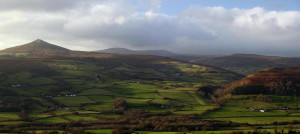
Herefordshire countryside
I was convinced as a child that there had been a horrible mistake and that all this pink and dollies and ‘but you’re a girl’ shit would stop at some point and that when I grew up I’d be the Lone Ranger. Sadly, as time passed that didn’t happen and, in a time where there were no words for what I felt and no apparent alternatives, I had no choice but to lump it.
Thank God for books and films with wonderful amazing heroes with whom I could sadly and secretly identify. I didn’t want to be their girlfriend, I wanted to BE Aragorn, Mr. Darcy, James Bond, Hephaistion, or Francis Crawford of Lymond. And I could never understand why the hero would be yearning over some tedious female when he often had a strong and brave friend with whom he could share adventures.
You have to remember that this was in the days when ‘the love that dare not speak its name’ was literally silenced and books that did feature same sex relationships were either pulp porn unobtainable in rural Herefordshire or so heavily coded as to be almost unintelligible. But in my pre-teens I fell in love with all Mary Renault’s characters without understanding the subtext and I wrote my own stories about “jolly good pals.” Eventually a friend pointed out that there were hardly any ‘feel good’ historicals with happy endings for gay men. Most focused on angst and persecution and weakness. He wanted something where the relationship wasn’t the source of conflict so I wrote Alike As Two Bees.
 AP: I’m a huge admirer of Mary Renault as well. She’s pretty much the gold standard for ancient world historicals in my view. But I think you and your friend make a good point about the traditional place of gay men as tragic characters in historical fiction and elsewhere. Speaking of Alike As Two Bees, I thought you captured an ancient Greek time period with compelling authority in that book. A Taste of Copper moves ahead a thousand years and then some. I know you work in a museum so I’ll hazard to say you have another area of expertise outside of writing. What is the research process like for you? There’s such detail in A Taste of Copper, from the description of armor and costume to daily life.
AP: I’m a huge admirer of Mary Renault as well. She’s pretty much the gold standard for ancient world historicals in my view. But I think you and your friend make a good point about the traditional place of gay men as tragic characters in historical fiction and elsewhere. Speaking of Alike As Two Bees, I thought you captured an ancient Greek time period with compelling authority in that book. A Taste of Copper moves ahead a thousand years and then some. I know you work in a museum so I’ll hazard to say you have another area of expertise outside of writing. What is the research process like for you? There’s such detail in A Taste of Copper, from the description of armor and costume to daily life.
EG: It’s SO handy to be able to put on a helmet to see how much you can see through the eye slits! Also I work in a castle so I know how appallingly cold and damp they can be. Apart from that I’ve got friends who are re-enactors so have been able to poke around their very well made and accurate kit to handle weapons and to experience the God-awful smell of tallow candles and the scarier aspects of medieval food production.
I’ve also attended lectures by experts in various fields and have access to a terrific library. Then there’s the BBC. Yes, they are scraping by on a licence fee so sometimes they cut corners, but when they decide to do something properly they put a lot of effort into it. In a recent programme about the development of Celtic culture they had managed to source proper early Roman Republican army kit. Was it 100% accurate? I don’t know, but I really appreciated that they had made the effort.

Gates to the Castle-Museum where Elin goes to work each day.
I make an effort too, though I know I’m never completely right. You have to know that you don’t know something in order to look it up and there’s always, always someone who knows more than you do. My advice is to do your best and accept the criticism with good grace.
AP: My very favorite character in the book was the rakish archer Hywel. For people who haven’t read the book yet, please scroll down a few inches on the page to skip some spoilers. I was rooting for Olivier to choose Hywel, and while his other love interest, the bullish, withholding Black Knight Maheris, evolves a bit into a softer and more expressive mate, I felt like Olivier and Hywel could have made for an interesting pair. Is there the possibility for a future for the two of them, perhaps in a further installment of the story?
EG: I’m so glad you liked Hywel. He’s my favourite too. In fact Olivier and Hywel enjoyed a much ‘closer’ relationship in my original manuscript, but I was warned that readers wouldn’t like it so had to cut that scene. But I love Hywel dearly, and I have an idea for a story where the cast is assembled again and Hywel finds someone who can keep up with him. I just need to find the time to write it.
AP: I enjoy romantic stories, and I especially like stories that show me something about the world that I didn’t know. For the lay reader, such as myself, there’s an assumption that England in the Middle Ages was a brutal place for most people, though it’s appealing to romanticize that era with visions of lush castles and chivalrous knights and beautiful princesses bedecked in fancy gowns. I know your book is essentially a romance, but I wonder if you thought about that balance of realism versus fantasy as you developed the story.
EG: Oh yes. I had to make some changes from the original manuscript mostly because medieval attitudes to hygiene would be unpalatable to modern readers. This was a culture for which washing was purely cosmetic, practical or a matter of comfort. Clean skin suggested that one was rich enough not to have to work. Greasy hands might slip on a sword hilt. A man would use his knife to cut his toenails, slit an enemy’s throat and cut his meat at table, with just a perfunctory wipe of the blade in between so the iron didn’t rust in the sheath. It was believed that one got sick by God’s will. To be clean was valued but most people had only one change of clothes and there’s no way to launder the heavy padding under armour. All fighting men stank.
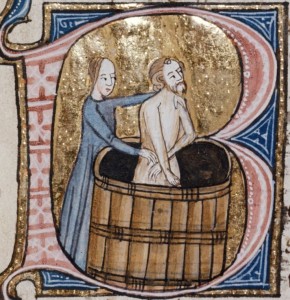
Painting of a man getting a bath, something that didn’t happen too often in the Middle Ages. Retrieved from medievalists.net
Likewise one has to adjust one’s language and mind set. The idea of human rights and the words used to describe them have changed radically over time. There are also words in common usage in the past that cause real distress if used in fiction now. One has to be aware of all that and walk yet another tightrope between historical accuracy and offending your readers. Historical inaccuracy, of course, offends a whole other set of readers. But decisions have to be made.
AP: I’m gathering from your books that you like a story where true love wins out in the end. Do you consider yourself a romantic? And if I might be so bold, have you had experiences that shaped that optimism which pervades the two stories?
EG: Sorry if this is a disappointment but I’m the least romantic person I know. I was never a flowers/perfume/intimate dinner type of person. I would sooner go abseiling or shoot my longbow or watch a film with plenty of explosions and then go for a round of darts and a pint of properly kept beer. This is British beer by the way, which is refreshingly cool to the lips but doesn’t give you a brain freeze.
That said I do like characters, my own as well as other people’s, to enjoy a good happily-ever-after or happily-for-now once the serious business of saving the world, defusing the bomb, getting the serum to Nome, has been accomplished. They’ve earned it. They deserve it. And at least in my fiction I can provide the type of happiness that often had to be very cautious in real life.
AP: What does the future hold for your writing? Are there other historical periods that you would like to explore?
EG: I have a bit of my bookshelf filled with hard backed spiral bound notebooks, one for each potential book. There’s a massive battered one for an untitled book set on the plains of 4th century BC Scythia. A Gleam of Splendour is set in 4th century BC Thebes and is about the Sacred Band. The Hounds of the North – 1st century Rome and Britannia. The Fierce Reaping – 6th century Northumbria. Plans for a sequel to On A Lee Shore – more 18th century pirates. A Perfect Shade of Blue – early 19th century Wales. Calon Lȃn – Wales 1916. Eleventh Hour – London 1928 [almost finished]. The Shepherd’s Hut – England 1940. I’ve got a few for contemporary fiction too, and they scare me worse than tigers because experts on say 6th century Northumbria are rare and few of them read M/M but everyone’s an expert on the modern day.
AP: Those titles sound amazing! I hope they make it out of your spiral notebooks and onto retailer shelves soon! You do a lot to support fellow authors through posting interviews and features on your blog and generally being a cheerleader for our work (do they have cheerleaders in the UK, or am I imposing my American sensibility?). Where does your passion to do that come from?

Elin’s Comfy Chair feature on her blog where she interviews fellow authors.
EG: Ah no, I don’t think we have cheerleaders. Or at least, not yet. We have WAGs – Wives and Girlfriends – who are supposed to turn up, cheer in the right places and generally be a credit to their menfolk. My British sensibilities sort of admire the cheerleaders’ athleticism while being a bit saddened at both groups’ objectification.
BUT – supporting other authors, that was the question. I started off my engagement with the LGBT writing community as a reviewer of m/m historical fiction so I’ve always felt that publicity/promotion is a more important part of my function in the community than my writing.
I do a bit of hosting, I do a lot of beta reading and I’m on the organizing committee for the UK Meet, a weekend long conference for writers, readers, bloggers, publishers etc of LGBT fiction. This year I think [hope] most attendees enjoyed themselves most of the time.

The colorful UK Meet 2015 Team (from l to r) Elin Gregory, Clare London, Cathy Laird, J. L. Merrow, Liam Livings, and Charlie Cochrane.
It’s such a relief to be in a place where one can chat to other people who are just as passionate about their books, where one doesn’t have to explain, excuse or justify what one writes or reads, where one can pick up help, advice, recommendations because everyone understands. I try to foster that type of atmosphere on my blog too. All are welcome from the grittiest realistic gay fiction to the toughest genre fiction to the fluffiest romance. Everyone should be able to find books they will enjoy with characters in whom they can see a little of themselves. That’s something really worth getting passionate about.
AP: Very well said, and thank you Elin for everything you do for our community. Many thanks for collaborating on the first-ever Pop Up Swap!! For readers wanting to learn more about Elin and her work, please do take a trip over to Elin’s WordPress blog, follow her on Twitter and check her out on Goodreads.
 Share on Facebook
Share on Facebook
